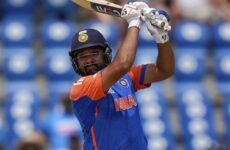 “He’s playing as well as I’ve ever seen him play.” That is the view of Darren Cahill, the astute Australian who coached Andy Murray briefly in 2011 and has watched him as a professional analyst since the Scot’s arrival on the Tour a decade ago. Going into Friday’s semi-final against Roger Federer that is some compliment from one of the most respected experts in the game, a former slam doubles champion who has the distinction of having coached the youngest ever world No1 in Lleyton Hewitt and the oldest in Andre Agassi.
“He’s playing as well as I’ve ever seen him play.” That is the view of Darren Cahill, the astute Australian who coached Andy Murray briefly in 2011 and has watched him as a professional analyst since the Scot’s arrival on the Tour a decade ago. Going into Friday’s semi-final against Roger Federer that is some compliment from one of the most respected experts in the game, a former slam doubles champion who has the distinction of having coached the youngest ever world No1 in Lleyton Hewitt and the oldest in Andre Agassi.
Cahill, who has been roaming the European circuit for 10 weeks with the broadcaster ESPN, says the match is too close to call but thinks Murray may have a slight advantage if he can win over a crowd who are invariably in love with Federer, no matter who he plays or where.
“Roger gets so much support,” Cahill told the Guardian. (Djokovic Brings Curtains Up on Wimbledon Semis Day)
“Everywhere he goes in the world he packs every single stadium. Normally he’s got 95% of the support behind him. This time he walks on to Centre Court and he’s not going to get that [level of] support because he’s up against Andy – and rightly so. How Roger handles that will be interesting.”
In the most recent of their 23 matches, in the ATP World Tour Finals at the O2 Arena in London last November, Federer handed Murray a career-worst 6-0, 6-1 hiding . At the same venue in 2012 – shortly after Murray had won Olympic gold – the crowd were embarrassingly with the Swiss against their home player. So there is baggage for them both to cope with.
“It’s always one of the classic match-ups,” Cahill says. “It’s the guy who spends a lot more time on the baseline against the guy who’s looking to attack and get to the net at most opportunities. It’s always great between these guys. Neither could have prepared better. The extra week between the French and Wimbledon has helped all the players, to make sure they are physically and mentally ready, playing their best tennis.
“They’ve had a couple of experiences together here before. In the [2012 Wimbledon] final Roger got the benefit after that rain delay, when he went in there [under the roof] and readjusted his tactics. And Andy got the better of him during the Olympic final. So to pick a winner in this match is just about impossible.
“We’ve spent hours going through the Xs and Os, and they are always close. In the end it’s going to come down to half a dozen points. Who’s a little bit braver, a little more courageous in the big moments, will probably end up being the winner. Neither of them sits back and waits for the game to come to them; each of them steps up and takes every opportunity.”If there is any edge between them, it will probably be well disguised. The only on-court bust-up they have had arrived during Murray’s 6-4, 6-7 (5), 6-3, 6-7 (2), 6-2 win in the Australian Open semi-final two years ago when they swapped glares across the net in the fourth set, the spat and the set going to the cool Swiss.
Novak Djokovic’s coach, Boris Becker stirred the pot on the eve of the tournament when publicising his new book by suggesting there was lingering animosity between the world No1 and Federer. But Cahill does not think these mind games have as much impact as people imagine. (It is a view not entirely supported by recent evidence – especially the Australian Open final between Murray and Djokovic).
He adds: “I don’t think it’s a factor any more. What these guys are competing for, what they’ve gone through the past seven or eight years for the rivalry they’ve had, I think it’s quite remarkable the relationship all four guys [putting Rafael Nadal in that mix] have got. So, no, I don’t think any personal elements of the relationship will factor into this match at all. They’re both playing for a spot in the Wimbledon final. That’s all they will have their eyes on.”
And Cahill senses new calm in the Scot since his marriage to Kim Sears in April. He also thinks Murray’s partnership with his coach of 12 months, Amélie Mauresmo, has helped him mature as a player.
“Over the past three or four years, we’ve seen him mature both on and off court. Recent developments – what’s happened to his personal life – have had a calming effect on him. He’s still the same professional he was when he first broke on to the Tour.
“He wants it as much now as when he was chasing that first major. That’s one of the reasons he’s still playing at this level, and he’s still capable of winning more majors. He’s been the sort of person who’s never going to leave a stone unturned in trying to get the best out of himself.”
Cahill detects some minor changes in Murray’s game, from adapting his physical preparation to his needs to the way he plays on court, using more of his skills as tennis shifts gradually away from the attritional game.
“Time on Tour and learning to understand your body better, you become a smarter athlete and a smarter tennis player. That’s what’s happening with Andy: he’s working out what suits him better and how to prepare himself better for the majors. The body reacts differently to different pressures. How Federer prepares is different to the way Andy prepares, to the way Nadal or Djokovic prepare. So you have to find what works for you and I think Andy has latched on to what works for him.
“You can’t get every decision right. When you’re younger and you’re facing the top players in the world you work extremely hard, but sometimes you might overwork a little bit in the wrong areas -with the right intentions, but you don’t know that until you go through those experiences yourself.
“With a little bit of trial and error, and also him being willing to do everything as well as he can, he’s been able to get his preparation pretty much right.”
Breaking News
 Driving Naari Programme launched in Chandigarh
Driving Naari Programme launched in Chandigarh Punjab farmers reaping benefits of Mann Government’s crop diversification initiatives
Punjab farmers reaping benefits of Mann Government’s crop diversification initiatives Punjab and Kerala Join Hands to Address NRI Concerns
Punjab and Kerala Join Hands to Address NRI Concerns Macron refuses French Prime Minister’s resignation after chaotic election results
Macron refuses French Prime Minister’s resignation after chaotic election results Modi lands in Russia for first visit since Ukraine offensive
Modi lands in Russia for first visit since Ukraine offensive Saudi Arabia approves granting citizenship to global experts under Vision 2030
Saudi Arabia approves granting citizenship to global experts under Vision 2030 Vigilance arrests Panchayat Secretary, former Sarpanch for embezzlement in Panchayat funds
Vigilance arrests Panchayat Secretary, former Sarpanch for embezzlement in Panchayat funds Housing crisis in Canada forcing residents to move out of pricier cities: Poll
Housing crisis in Canada forcing residents to move out of pricier cities: Poll Historic Milestone: Canada Appoints Its First Female Chief of Defense
Historic Milestone: Canada Appoints Its First Female Chief of Defense Victory parade of T20 World Cup-winning Indian cricket team concludes in Mumbai
Victory parade of T20 World Cup-winning Indian cricket team concludes in Mumbai Maximizing impact of Aadhar in Punjab
Maximizing impact of Aadhar in Punjab Amritpal Singh to take oath as Khadoor Sahib MP on July 5
Amritpal Singh to take oath as Khadoor Sahib MP on July 5



































